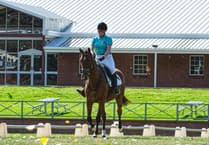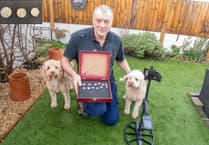A firm which “printed” concrete walls for a gold medal-winning garden at the Chelsea Flower Show was among the Forest companies honoured for their innovation.
Innocrete 3D, which is based at the Longhope Businesss Park, was one of five companies recognised at the Forest Economic Partnership’s Innovation Awards.
Grazing Management, which combines traditional land management techniques with state-of-the-art monitoring was joint first, along with Innocrete, in the less than 100 employees category.
The award for those with more than 100 employees went to Hartpury College and University for their significant contributions to innovation within the education and land-based sectors.
There were also two highly commended awards which went to Wye Valley Flowers and Cinderhill Farm.
The awards, which were sponsored by Watts of Lydney, were presented at ceremony at Lydney Town Hall last Wednesday (June 11).
Pupils from Forest High School in Cinderford designed the awards.
They worked with the Innovation Lab at Coleford Library, using artificial intelligence to make their designs, based on the environment and culture of the Forest, a reality.
There were 23 entries with the judging panel saying they were “thoroughly impressed by their quality and diversity.
The structures built for Killik and Co’s Save for a Rainy Day garden at this year’s Chelsea Flower Show were the tallest Innocrete 3D has created.
John Tatlow, of Innocrete 3D, said they had several meetings with garden designer Baz Grainger about the 2.65m (about nine feet) wall.
He added: “We took our printer down there on a low loader (and) printed part of it on site.”
The firm uses an industrial robot which can be programmed to make customised structures.
“It's also an eco-friendly material and generally the structures are hollow so the weight of what we’re making is far, far less
“The material we use contains less than five per cent Portland cement, the rest is a greener product so the environmental impact is big, the structures are lighter and its totally customisable.
“The potential is enormous.”
The judges commented: “This is excellent innovative design and manufacturing proven by being a significant contributor and Chelsea Gold Medal winner.
“The practical application of the power of AI is well demonstrated in its use for materials, design and forecasting. Pioneering and very environmentally friendly.”
Emily Crawley, of Conservation Grazing, said there were working at sites across the Forest.
She said: “We're bringing cattle and goats into ecologically sensitive areas to replicate their ancient forefathers but we're using loads of in innovative technology to make that possible.
“We use collars, with chips which communicate with us to tell us about the cattle and how they're getting on – health, movement, all that sort of data,
“We’recombining really traditional land management techniques with some new technology.”
The judges said: “This is a great example of innovation in a traditional sector.
“It blends tech with ecology in a way that supports biodiversity and improves safety and control.
“A strong entry with clear environmental and operational benefits.”
Hartpury started as an agricultural college in 1948 but expanded in the 1990s and now includes sport, veterinary nursery, equine and agriculture.
It is now two separate institutions – the college and the university – which are located on the same site.
Steve Draper, who is academic dean, said: “Hartpury prides itself on applied research, so we've always set ourselves up to be real world and answering industry questions.
“Equine’s a really good example, working with Master saddlers, for example, taking industry questions and making that live in our research programme and in our in our curriculum
“We have our digital innovation farm we have the agrictech centre so innovation is at the heart what we do.”
The judges said: “Hartpury’s impact is on a completely different scale — and their focus on applied research and knowledge exchange is a huge asset to the Forest. What stands out is how they make research feel real and relevant — rooted in practical outcomes, not just academic theory.”
The two highly commended awards were both in the less than 100 employees category.
Jo Thompson, who runs the Wye Valley Flowers farm at St Briavels, said British growers were enjoying a “real renaissance”.
She said: “We’re a sustainable flower farm so we grow without pesticides and chemicals, we recycle and harvest all our water.
We’ve got composting loos – we’ve got a glamping site – so our tourists leave deposits which we mulch our flowers with.
“British flowers are having a real renaissance, so much so that we provided flowers for the Coronation.
“If you put in your postcode there is grower probably within 20 miles able to supply seasonal flowers that just capture a snapshot of what's growing at that time.
“The average shop-bought bouquet has travelled 4,000 miles.”
The judges said: “This is a genuinely values-led business – from organic growing to fair wages and zero plastic.
“It’s not techy innovation, but it is a complete shift in mindset for an industry not known for sustainability.”
Cinderhill Farm produces half a million products such as sausage rolls from its new base in Cinderford using solar energy.
Deborah Flint, who set up the business in St Briavels with husband Neil, said: “We cook almost all our sausage rolls on sunshine, which we were supported by the Forest of Dean District Council to put in.
“We have over 100 kilowatt hours of electricity and we have many different new technologies such as heat recovery systems.
The range of products was recently expanded with more vegetarian and vegan options working with producers The Parsnipship.
Deborah added: “One of our sausage rolls has the same amount of protein but half the fat of 100g of peanut butter.”
The business is also investing in its staff and has created a number of apprenticeships.
“We've been really impressed by the quality of people that we found in the Forest.”
The judges said: This is a brilliant example of a business thinking differently from the ground up.”
Nicola Bird, Chair of the Forest Economic Partnership, said: “We were really impressed by the innovations showcased across the entries we received.
“It’s testament to the dynamic and forward-thinking business community we have here in the Forest of Dean. “From Hartpury's innovative leadership in the large business category to our joint winners, Innocrete 3D and Grazing Management, we've seen fantastic examples of how different sectors can drive progress, and we are thrilled to celebrate their success. John Thurston, Chair of Watts of Lydney Group, added, “Watts of Lydney Group has been innovating in the Forest of Dean since its conception.
“As part of the fabric of this community for generations, and we have always championed local enterprise.
“The quality of the entrants was really strong, and it gives us great confidence in the economic future of the Forest.
The panel comprised Nicola Bird, founder and chief executive of the Accxel construction college in Cinderford and Chair of the Forest Economic Partnership (FEP); Wendy Jackson, the Forest Council’s Director for Sustainable Economy and Director of the FEP; Cllr Johnathan Lane, the Forest Council’s Cabinet member for Economy and Director of the FEP; Dev Chakraborty, Gloucestershire County Council’s Head of the New Growth and Enterprise Team; Ian Mean, Director of the FEP; and John Thurston, Watts of Lydney.




Comments
This article has no comments yet. Be the first to leave a comment.